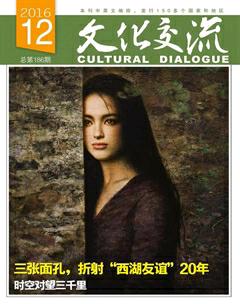三张面孔,折射“西湖友谊”20年
戚永晔
20年,43个国家,599位外国友人。
这些傲人的数据,齐齐指向的,是浙江省人民政府为表彰外籍专家在浙江省经济建设和社会发展中所作出的突出贡献和奉献精神而设立的最高奖项。
为纪念西湖友谊奖设立20周年,特别设立了西湖友谊杰出贡献奖,授予了3位外国专家,他们分别于1997年、2003年、2006年获得西湖友谊奖,并在获奖后一直留在浙江,为这片土地默默奉献,他们代表了不同时期在浙外国专家的风貌,也是中外友好交流的缩影。
最“资深”获奖人:“喜欢他们喊我‘老西”
今年85岁的俄罗斯人西特里维·德米特里·尼基弗诺维奇有个绰号叫“老西”。在他工作的巨化集团,同事们都喜欢这么称呼他。而“老西”也很喜欢这个称呼,他说,这让他有了一种融入的感觉。
当从浙江省委副书记、代省长车俊手中接过西湖友谊杰出贡献奖的奖杯与证书时,西特里维激动地表示:“1997年浙江省政府颁发给我西湖友谊奖,今天又颁发给我西湖友谊杰出贡献奖,我感到万分荣幸。感谢省政府对我们贡献的高度评价!”
1992年,俄罗斯化学领域的最高科研机构——成立于1919年的应用化学研究院(现更名为俄罗斯应用化学科研中心)应邀派出专家组来到巨化,与中方合作开展当时尚处于创业阶段的氟化工项目建设。时年61岁的老西作为该院设计院的院长助理,第一次踏上了日后成为“中国氟都”的热土。当时,他并没有想到在此后的20多年里把自己的心血都奉献给了这里。
在此之后,西特里维数十次飞越欧亚大陆,奔波于中俄两国之间,搭建国内厂家及科研单位在俄罗斯交流与合作的桥梁。至今,中俄双方已在巨化中俄技术合作园进行了10多个项目的成功合作。
20多年愉快的巨化工作和生活,也让很多巨化人都知道这位慈祥安静、满头白发的老人是来自俄罗斯的氟化工专家。只要身体和时间允许,单位的领导和同事时常会陪西特里维外出游玩,陪他登山、钓鱼、摘橘子……很多相处多年的氟聚合物事业部员工都和他成了好朋友,常年为他服务的同事们更是与他亲如一家。西特里维的司机王晓全说:“要是不会点俄语,和老西交流会不顺畅,所以这些年下来,我自学了点俄语的日常用语。”
尽管身处异国他乡,但西特里维说:“从没感觉到孤独,要是问我是中国同事给我的关心多还是俄国同事给我的关心多,那很显然,是中国同事给予的多——中国人更看重感情。”
老西勤勤恳恳、尽职尽责的工作得到政府部门的褒奖:1997年获得浙江省西湖友谊奖,1998年获得国家友谊奖;2000年获得中华人民共和国永久居留权——这在当时整个浙江省仅有7人;2004年被选为浙江省首位外籍劳动模范;2010年荣获全国人民友谊贡献奖……作为优秀外籍专家和中俄友好人士,西特里维多次受到党和国家领导人的接见,每次他出现在中央电视台的新闻联播节目中,都能让巨化的同事、朋友欢欣鼓舞。
最“遥远”获奖人:“中国圆了我的梦”
如果说老西以年龄和生活在浙江的时间长、荣膺最“资深”获奖人的话,那么离家最“遥远”的,就非克劳斯·菲尔特莫属。这位83岁的德国人,在杭州和柏林之间往返长达22年,每次都经历至少12个小时的飞行,但杭州确实是他一直勾留、不舍离去的地方。
这位原国际赛艇联合会器材委员会主席,帮助了一个家庭作坊式的工厂变成了全球最大的专业赛艇制造企业“浙江华鹰控股集团”。扎根杭州多年,他用自己的睿智和德国人的诚恳,和浙江人一起铸造出“Made in China”,雅典、北京、伦敦、里约奥运会的比赛用艇。
来中国之前,克劳斯·菲尔特就有一个心愿:寻找合适的合作伙伴,造出世界上最轻、最快、造价低廉的赛艇。1995年,一次偶然的机会,杭州飞鹰船艇公司与克劳斯有了接触。“我感觉,这是一个实现我梦想的契机。”
从那时开始,克劳斯就开始了他在杭州的生活:“最大的感受就是中国政府的开明和政策的开放,这里是投资和工作的好地方。”而他也用实际业绩回馈中国人:国内外运动员,用他设计的“无敌”赛艇,获得了包括世界冠军在内的300多块金牌。2003年至2004年,“无敌”赛艇成为雅典奥运会赛艇唯一中标产品,从此,世界赛艇产品才有了“富阳制造”。也是在那两年,克劳斯先后获得西湖友谊奖和国家友谊奖。
接受采访中,克劳斯始终流露着对第二故乡中国的深厚感情:2008年四川遭受地震之灾时克劳斯身在德国,他坐立不安,多次致电杭州的工作伙伴询问灾区的救援情况,并慷慨解囊,为灾区捐款。
当北京奥运会圣火在杭州传递时,克劳斯也是火炬手之一,他曾对媒体说:“我要通过祥云圣火把自己的祈祷和祝福带给灾区人民,中国人给我的感觉一向乐观和坚毅,相信他们一定可以很快渡过难关!”
“这些年来,我总是倾我所有,力求能把自己毕生的研究和经验传授给中国的工程技术人员,看到亲手参与建设起来的现代化企业,目睹中国的快速发展。”克劳斯动情地说。
最“融入”获奖人:“我的中文讲得可溜了”
如果有人问三位专家里哪位最融入中国文化,那无疑是64岁的印度人库玛,原因很简单,他说的中文最溜。
作为浙江农业科学研究的带头人之一,他带领团队突破了无菌培养等技术瓶颈,大大提高了生产效益。这些成绩的背后,其实是库玛及其团队的充分融合、通力协作。
2002年,受浙江省农业科学院之邀,曾在印度建立年产1000万出口组培苗实验室的库玛来到省农科院植物组培中心工作。“省农科院做组培研究有20多年了,但是产业化能力不足。我们邀请库玛作为专家来指导。”院长陈剑平说。
大家没想到的是,这位印度博士一点都没有架子,很快和大家打成一片,几年工夫下来,从不会说一句中文到能吃很辣的四川火锅,用筷子夹花生米,说很顺溜的中文……
“每年春节,库玛都会跟我或陈剑平到我们的家乡过年。”省农科院蔬菜研究所副所长徐志豪说,“他喜欢放鞭炮、包饺子,有时也跟着我们走亲戚,很享受中国式的年味。”曾有一家外省企业欲高价挖走库玛,被库玛回绝。对杭州、对省农科院这个大家庭,库玛已产生深厚的感情,“未能抛得杭州去,一半勾留是此湖”,他多次表示想加入中国国籍,终老杭州。
而他带领团队的能力也是有目共睹的,针对组培中心污染率高、产业化能力不足等问题,库玛进行技术攻关,将污染率从15%降到5%以下,相同产值利润增加近10%。“没有库玛,就没有这个产业。”徐志豪说。2009年,库玛和老西、克劳斯一起被授予国家友谊奖荣誉称号,这是一个外国人在中国能够得到的最高荣誉。
确如浙江省委副书记、代省长车俊说的那样,“人才兴则事业兴。未来的竞争是科技的竞争、创新的竞争,更是人才的竞争。”外国专家们在浙江创造价值、建立功勋的同时,也把浙江友谊的种子撒向世界各地。
(本文照片由作者提供)
The year 2016 marks the 20th anniversary of Zhejiang West Lake Friendship Award. Over the past 20 years, 599 foreign experts from 43 countries have been awarded the special honor for their contributions to the economic and social undertakings of the province.
To mark the 20th anniversary of the award, Zhejiang issued a special award to three experts who received West Lake Friendship Award respectively in 1997, 2003 and 2006. What makes them special is that they have continued their work in Zhejiang since the first awards. They not only make contributions to the provinces economic and social growth, but also embody the ties between China and the rest of the world.
The three honorees are Sityvi Nikivlovich, Klaus Filter and Aanil Kumar.
Sityvi Nikivlovich is 85 years old now. His colleagues at the Juhua Group in Quzhou in southwestern Zhejiang call him Old Si. Old Si loves the endearing name because it enables him to feel the intimate bond between him and his Chinese colleagues.
At the age of 61, he came to China in 1992 to help Chinas emerging fluoride industry. He was not to know that he would spend the next 20 some years contributing to the fluoride industry of China. He shuttled back and forth between China and Russia, building up ties between Chinese manufacturers and research institutes and their Russian counterparts. At present, the two countries have carried out more than ten projects at the China-Russia Tech Park in Quzhou.
Old Si has been working fruitfully and living pleasantly in Quzhou for more than 20 years and he is a celebrity in Quzhou. His colleagues take him around for sightseeing. Old Si has made quite a few friends, including his colleagues and those who provide services at home. Wang Xiaoquan, his driver, now speaks some Russian. He has been working for Old Si for years and knows the importance of the Russian language. So he has managed to pick up some Russian phrases and words.
Old Si received Zhejiang West Lake Friendship Award in 1997, the Chinese Government Friendship Award in 1998. In 2000 he received the green card for permanent living in China. This was quite rare, for he was one of the seven foreigners in the province who had been granted the privilege. He has received numerous awards and met with the top Chinese party and state leaders.
Klaus Filter is now 83 years old. For the past 22 years, he has shuttled to and fro between Hangzhou and Berlin numerous times. Before he came to Hangzhou, he had wanted to make a racing boat that was the lightest, fastest and cheapest in the world. In 1995 he came into contact with Huaying, a business that makes racing boats in Hangzhou. He realized that it was an opportunity to make his dream come true.
So he began his work and life in Hangzhou. Deeply impressed by the wisdom and good policies of the Chinese government, he considers Hangzhou an ideal place for investment and entrepreneurship. His dedication has paid off. Wudi Brand racing boats have won more than 300 gold medals in various competitions including many at the world level. In 2003 and 2004, Claus Filter was respectively awarded West Lake Friendship Award and Chinese Government Friendship Award.
The 64-year-old Aanil Kumar speaks Chinese fluently. The Indian is an agriculture scientist who came over to Hangzhou in 2002 at the invitation Zhejiang Academy of Agricultural Sciences. He had worked in a lab in India specialized in plant tissue culture. The academy in Zhejiang had been in the tissue culture project for two decades but its capability of turning research results to industrialization was inadequate. Kumar has helped. He has solved problems such as pollution in tissue culture and inadequate industrialization. The pollution rate dropped from 15% to 5%, raising profitability by 10%. “The industry would not flourish but for Kumar,” commented a colleague at the academy. Kumar received Chinese Government Friendship Award in 2009. One of the biggest pleasures Kumar enjoys in Hangzhou is to spend Spring Festival with at a colleagues home.

